- Home
- Deborah Harkness
Time's Convert Page 7
Time's Convert Read online
Page 7
“Stop this nonsense. What is a foolish son?” His mother jiggled Patience up and down on her hip. Patience was teething, which made her fractious and soggy.
“A heaviness to his mother,” Marcus said, turning to the page of alphabet verses. There was the proverb—right at the top: A wise son maketh a glad father, but a foolish son is a heaviness to his mother. His mother was always pointing it out to him.
“Recite the rest of the alphabet,” his mother instructed, walking the edges of the room to keep Patience’s mind off her discomfort. “And no mumbling. They don’t allow boys to attend Harvard College if they mumble.”
Marcus reached L—Liars shall have their part in the lake which burns with fire and brimstone, his mother intoned when he had trouble reading out the words—when the wooden gate that protected their front garden from the geese and the traffic opened. His mother froze.
Marcus turned in his chair and pressed his eyes to the two holes bored into the top slat. The holes were for hanging the chair up on the pegs by the kitchen door, but Marcus had discovered they were excellent peepholes. He felt like a bandit or an Indian scout whenever he peered through them. Sometimes, when his mother and father were occupied and he was supposed to be doing his lessons or watching Patience, Marcus pulled the chair to the window and watched the world go by, imagining he was on the lookout for heathens or that he was a captain on a ship staring through a telescope, or a highwayman peering through the trees at his next victim.
The front door creaked open, letting in the wind and the rain. A black wool hat, wide brimmed and sodden with moisture, sailed through the air and landed atop the newel post. Marcus’s father used the globe-shaped wooden ball to teach him geography. Pa had inscribed the eastern coast of America on it with black ink that stained the wood, as well as an irregular splotch that showed how far across the ocean the king was. Even so, Pa said, he was watching over his people in America. Ellie polished the post on every visit, but the ink never faded.
“Catherine?” His father stumbled over something in the hall and swore.
“In here, Pa,” Marcus called before his mother had a chance to respond. Marcus had learned not to fling himself into his father’s arms the moment he arrived home. His father didn’t like to be taken unawares, not even by someone as small and familiar as Marcus.
Obadiah MacNeil stepped into the room, swaying slightly on his feet. The scent of smoke and something sweet and cloying followed him. He was holding the heavy iron bootjack that normally sat by the front door.
Peeking through the chair slat, Marcus saw that his father wasn’t wearing his woolen muffler around his neck as he usually did. It was a jaunty red that stood out like the color of the fruits left on the rose bush when the first snow fell. Today, his linen shirt was open at the neck, the simple cravat askew and stained.
“Chairs are for asses, not knees.” Obadiah ran a grimy hand under his long, sharp nose. It left a smear of yellowed earth. “Did you hear me, boy?”
Marcus swung around and slid his feet over the seat, cheeks burning. His father had told him that dozens of times. A rough hand pushed against the back of the chair, sending Marcus toward the table. The edge hit him in the chest, knocking the wind out of him.
“I asked you a question.” Obadiah braced his arms on the table, surrounding Marcus with wet wool and that sickly sweet smell. The bootjack was still in his hand. It was crafted in the shape of a devil, with the prongs of his horned head serving for the heel rest and the long body the brace. The devil’s eyes winked up at Marcus, two black holes above a leering mouth.
“I’m sorry, Pa.” Marcus blinked back the tears. Soldiers didn’t cry.
“Don’t make me tell you again.” Obadiah’s breath smelled of apples. He stood.
“Where have you been, Obadiah?” Marcus’s mother put Patience into her cradle by the fire.
“No business of yours, Catherine.”
“On West Street, I warrant.”
His father didn’t respond.
“Was Josiah with you?” his mother asked. Marcus didn’t much like Cousin Josiah, whose eyes shifted when he spoke and whose voice echoed against the rafters.
“Leave it, woman.” Obadiah’s tone was weary. “I’m off to the barn. Zeb is there tending to the animals.”
“I’ll help, too!” Marcus scrambled off the chair. Unlike Cousin Josiah, Zeb Pruitt was one of his favorite people. He’d taught Marcus how to string a fishing rod, how to catch mice in the barn, and how to climb the apple tree. Zeb had also made sure Marcus understood that the geese in town were more dangerous than the dogs, and could give a person a savage bite.
“Zeb doesn’t need your help,” said his mother. “Stay where you are and finish your lesson.”
Marcus’s face fell. He didn’t much feel like reading. He wanted to go to the barn and march up and down the center aisle to Zeb’s commands, playing at soldier and hiding behind the water trough when the enemy pursued him.
His mother hurried out of the room after his father, who had left the front door open to the elements.
“Mind that Patience doesn’t fall out of her cradle,” she told Marcus as she took her shawl down from a peg and left the house.
Marcus stared glumly at his sister. Patience sucked on her fist, which was shiny with spittle and bright red from the constant gnawing.
His sister would make a terrible soldier. Marcus brightened.
“Do you want to be my prisoner?” Marcus whispered, kneeling by the cradle. Patience cooed her assent. “All right, then. You stay where you are. No moving. And no complaining. Or you’ll be flogged.”
Marcus rocked the cradle gently, lessons forgotten, and imagined himself in a cave in the woods, waiting for his commanding officer to arrive and praise him for his valor.
* * *
—
“YOU MUST HAVE BEEN up all night with the commotion, and the traffic between town and the burying ground.” Old Madam Porter put a small cup and saucer on the table at his mother’s elbow. Marcus could see the wallpaper, blue as the spring sky, through the eggshell-thin cup.
Madame Porter’s house was one of the finest in Hadley. It had smooth wooden paneling and brightly colored paint as well as patterned wallpaper. The chairs were carved and padded for comfort. The windows opened up in the new way, not out like the old casements at their house. Marcus loved to visit—not least because there was usually Madeira cake studded with currants and spread with jam.
Marcus counted to five before his mother reached for the tea. Chaunceys didn’t gobble their food or behave as though they couldn’t remember their last meal.
Something poked Marcus in the ribs.
It was a wooden whirligig, and Miss Anna Porter was at the end of it. She was Madam Porter’s granddaughter, and she never let Marcus forget that she was one year and one month older than he was. A roll of her brown eyes and a toss of her red head suggested they leave the adults to their conversation and find amusement elsewhere.
But Marcus wanted to stay where he was and hear what had happened at the cemetery. It was something bad, something nobody would talk about in front of him and Anna. Marcus hoped a ghost was involved. He liked a good ghost story.
“They asked for my help, and I had no one to send but Zeb.” Madam Porter sat down with a deep sigh. “It’s on stormy nights when there is a pounding at the door that I miss having a husband.”
Marcus’s mother made a sympathetic noise and sipped at her tea.
Madam Porter’s husband had died a hero, in battle. Zeb had told stories about Master Porter, though, that made Marcus wonder whether he had been a nice man.
“Really, Catherine, you should rent a house in town. Living out by the burial ground cannot be salubrious,” Madam Porter said, changing the subject. She picked up her needlework and began to stitch a bright pattern on the cloth.
“My grandmothe
r said your pa is a drunkard,” Anna whispered, her freckled eyelids narrowed into slits over pale eyes. She was waving the whirligig to and fro, which made the arms move in slow circles. The face on the whirligig, with its curled black hair and dusky skin, looked like Zeb Pruitt.
“Is not.” Marcus grabbed at the whirligig.
“Is too,” Anna taunted, still in a whisper.
“Take that back!” Marcus wrestled the whirligig from Anna’s hands.
Madam Porter and his mother turned, shocked by his outburst.
“Ow!” Anna grabbed at one of her long red curls, lip trembling. “He pulled my hair.”
“I did not,” Marcus protested. “I never touched you.”
“And he took my toy.” Anna’s eyes welled over, her tears dampening her cheek. Marcus snorted.
“Marcus MacNeil.” His mother’s voice was low but intense. “Gentlemen do not steal from defenseless women. You know better than that.”
Anna had strong arms, ran faster than a scalded cat, and had many hearty male cousins. She was far from defenseless.
“Nor do they torment young ladies with pinches and pulls,” his mother said, dashing Marcus’s hope of reprieve. “Since you are not fit for polite society, you will beg Anna’s forgiveness, and Madam Porter’s, too, and wait for me in the barn. And when we get home, your father will hear of this.”
And he would be angry. Marcus’s lip trembled.
“I’m sorry, ma’am,” Marcus said, bowing slightly to Madam Porter, his fists clenched behind his back. “Please forgive me, Anna.”
“A very pretty apology,” Madam Porter said with an approving nod.
Marcus fled to the barn without waiting for Anna’s response, swallowing down his fears about what awaited him at home and his tears at his mother’s rebuke.
“You all right, Master Marcus?” Zeb Pruitt was propped up on his pitchfork in one of the stalls. Standing beside him, long of limb and broad of shoulder, was Joshua Boston.
“Something happen at the house?” Joshua spit out a long, thin stream of brown liquid. Unlike Zeb, who was in stained work clothes, Joshua was wearing a wool coat with polished buttons.
Marcus hiccupped and shook his head.
“Hmm. Something tells me Miss Anna has been up to mischief,” Zeb said.
“She said my pa is a drunkard,” Marcus said. “It’s not true. He goes to church every Sunday. God answers your prayers. Pa says so. And now I have to tell Pa what happened with Anna and he’s going to be angry with me. Again.”
Zeb and Joshua exchanged long looks.
“Just because a man takes himself to Smith’s tavern on a rainy night to dry off by the fire doesn’t make him a drunkard.” Zeb stuck his pitchfork into a nearby pile of hay and crouched down so he was eye level with Marcus. “What’s this about Mr. MacNeil being angry?”
“He was out all night, and when he came back I was kneeling on the chair. He told me not to do it, hundreds of times.” Marcus quivered just thinking about it. “Pa told me not to disobey him again, or I’d get another beating.”
Joshua said something under his breath that Marcus didn’t catch. Zeb nodded.
“You be sure you stay away from your pa if he’s in a dark mood,” Zeb told him. “Hide in the henhouse, or under the willow by the river until you think it’s safe.”
“How will I know when that is?” Marcus asked, worried he might miss dinner.
“You’ll learn,” Zeb said.
* * *
—
THAT NIGHT, MARCUS TOOK HIS pillow and arranged it at the top of the stairs. The pain in his backside and legs had gone from a fierce burn to a dull ache. His father had given him the promised beating, and had used a leather strap from the barn this time rather than his hand so that Marcus wouldn’t forget the lesson.
His ma and pa were arguing in the kitchen. Marcus couldn’t make out what the fight was about, but he suspected it had to do with him. His stomach growled with hunger—there hadn’t been enough food at dinner, and his ma had let the bread they were supposed to have with it burn.
“Mind your place, Catherine,” his pa said, storming out of the kitchen and grabbing his hat off the newel post. The woolen felt was dry now, but the brim had wilted and it no longer had a familiar, triangular shape.
Marcus opened his mouth, ready to call out another apology in an attempt to end the shouting. But he wasn’t supposed to interrupt his father and mother when they were talking, so he waited, hoping that his father would turn around and see him sitting there and ask what he was doing out of bed.
“It’s my place to keep this family from ruin,” his mother retorted. “We barely have enough to eat. How are we going to manage if you keep drinking away what’s left of our money?”
His father whirled around, one hand lifted in the air.
Catherine cowered against the wall, shielding her face.
“Don’t you make me give you a beating, too,” Obadiah said softly as he walked out the door.
He never did look back.
7
Two
14 MAY
Phoebe’s second day as a vampire did not include the dreamy, rapturous experiences she’d had on the first. While her body was learning how to be still, her mind could not—would not—be quiet. Memories, images from her years studying the history of art, lyrics from her favorite songs—all these and more flitted across her brain in an unsettling film where she played the starring role and also comprised the entire audience. Since she had become a vampire, her memories were weirdly addled and unusually sharp.
Her first bicycle was navy blue with white stripes on the fenders.
Where was it now? Phoebe wondered. She thought she had last ridden it at the house in Hampstead.
There was a pub in Hampstead, perfect for stopping in and having lunch when you took a Sunday walk.
Not that she would ever have a Sunday lunch again, Phoebe realized. What would she do on Sundays in the years to come? How would she entertain friends? Neither she nor Marcus went to church. They would have to create a different Sunday routine after they got married, one that didn’t revolve around a big meal.
The church in Devon where her best friend got married had a beautiful window with bits of blue and rose glass in it. Phoebe had stared at its colors and intricate patterns all through the service, marveling at its beauty.
How old was that window? Phoebe was not a glass expert but she suspected it was Victorian—not very old at all.
The celadon glass pitcher downstairs was far more ancient.
Could it be Roman, maybe third century? Its value would be enormous if that were so. Freyja shouldn’t keep it where it could be smashed.
Phoebe had spent a summer in Rome, digging in the ruins and learning about tesserae. It had been so hot and dry that the air singed the tiny hairs in her nose and every inhalation scoured her lungs.
Had her nose changed? Phoebe got up and looked in the time-clouded mirror. Reflected there was the room behind her: the elegant curves of the Second Empire bed, the small canopy suspended from the ceiling that turned the bed into a cozy enclosure, the elegant armoire, and a deep armchair expansive enough that you could curl your feet up underneath you when you were reading.
A crease had reappeared in the bedspread.
Phoebe frowned. She had smoothed out that wrinkle. She remembered doing it.
Before she could complete her next thought, she was kneeling on the mattress. Her hands pressed the fabric, over and over. Every fiber of the sheets was palpable, and rough to her touch.
“No wonder I can’t sleep. They’re too coarse.” Phoebe tore at the linens, intending to drag them from the mattress so they could be replaced with something proper, something that wouldn’t scratch her skin and keep her awake.
Instead, she reduced them to ribbons, shredding them with nails that
had the sharp ferocity of an eagle’s talons.
“We’ve reached the terrible twos, I see.” Freyja entered the room, her blue eyes frosty over high cheekbones as she surveyed the damage Phoebe had inflicted on the room.
Phoebe had been warned about her second day, and how it seemed to mimic the trials and tribulations of the second year of human age, but she’d had no context for the warning, having never been a mother. She could not remember her own time as a toddler, and not a single one of her friends had children yet.
“Are you nesting?” Françoise, whose once-miraculous omnipresence had become just another source of irritation, studied the mess Phoebe had made.
“The sheets are scratchy. I can’t sleep,” Phoebe said, unable to keep the petulance from her tone.
“We have spoken about this, Phoebe dearest.” Freyja’s voice was reasonable, compassionate. The endearment grated on Phoebe’s raw nerves nonetheless. “It will be months before you take your first nap. A deep sleep is still years away.”
“But I’m tired,” Phoebe complained, sounding like a troublesome child.
“No, you’re bored and hungry. A draugr must be very precise about her emotions and state of mind, so as not to be caught up in fantasies of feeling. Your blood is far too strong and restless to need sleep.” Freyja noticed something in the window, a tiny imperfection. One of the panes was cracked. Her attention zeroed in on the crazed glass. “How did that happen?”
“A bird.” Phoebe lowered her gaze. There was a split in the floor—or was that the grain in the wood? She could follow the line forever. . . .
“This crack begins on the inside,” Freyja said, inspecting it more closely. “I will ask you one more time, Phoebe: How did this happen?”
“I told you!” Phoebe said, defensive. “A bird. It was outside in the tree. I wanted to get its attention, so I tapped on the glass. I didn’t mean to break anything. I just wanted it to look at me.”
The bird would not stop singing. At first Phoebe had found the song enchanting, her vampire ears attuned as they never had been to the trills and warbles. As it went on—and on—however, she wanted to wring the bird’s neck.

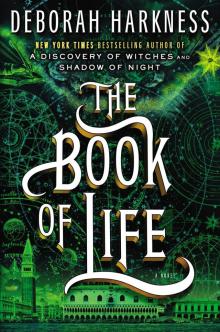 The Book of Life
The Book of Life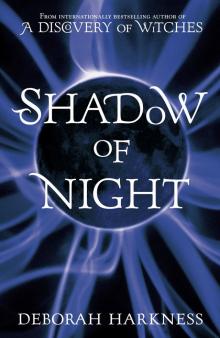 Shadow of Night
Shadow of Night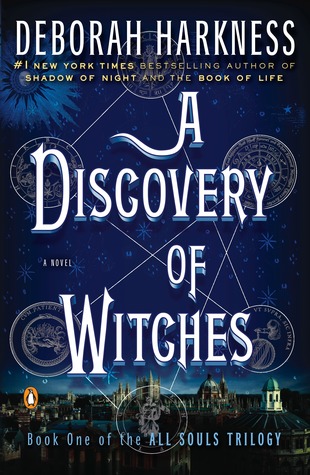 A Discovery of Witches
A Discovery of Witches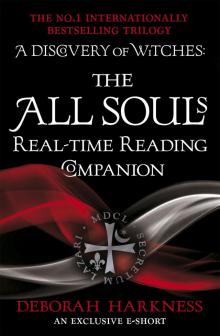 The All Souls Real-Time Reading Companion
The All Souls Real-Time Reading Companion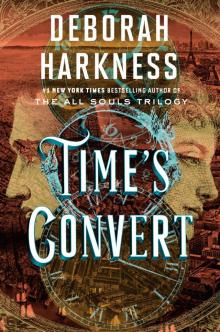 Time's Convert
Time's Convert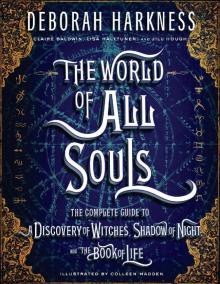 The World of All Souls
The World of All Souls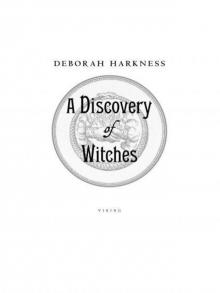 A Discovery of Witches: A Novel (All Souls Trilogy)
A Discovery of Witches: A Novel (All Souls Trilogy)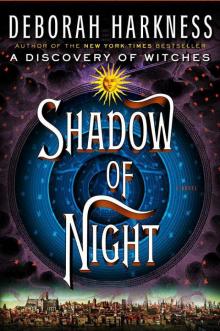 Shadow of Night: A Novel
Shadow of Night: A Novel